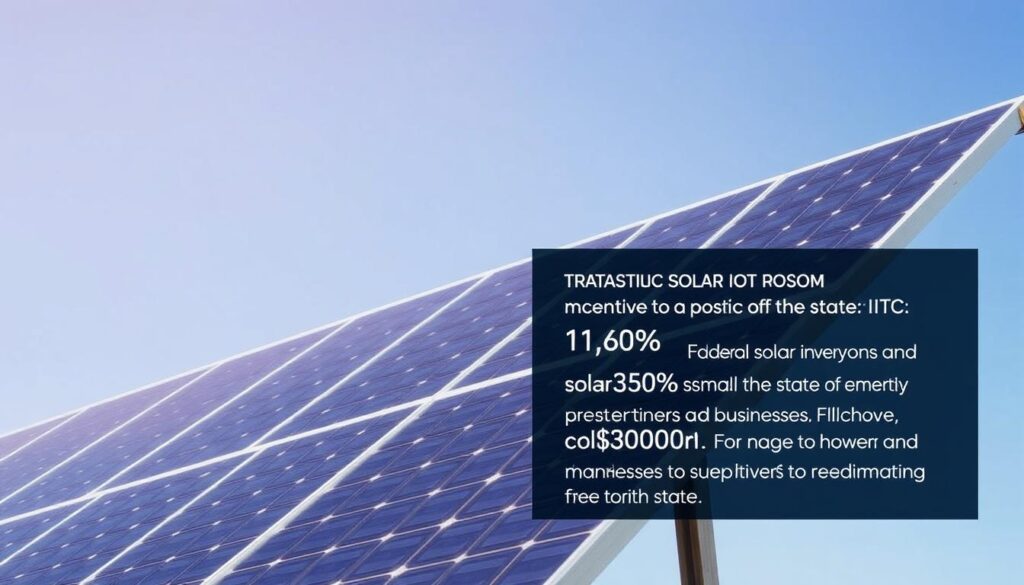Florida’s solar panel tax incentives florida make going solar more accessible than ever. The 30% federal tax credit reduces costs upfront, while florida solar incentives like property tax exemptions add to savings. With average yearly savings of $7,560 and a 5–7 year payback period, homeowners can enjoy decades of free energy after the break-even point.
These tax incentives for solar panels in florida include exemptions from property and sales taxes. Net metering programs let you earn credits for excess energy, lowering bills further. Low-interest loans and programs like PACE financing make installation affordable, even with no down payment. Rising electricity costs—up 18% in two years—make solar a smart move for long-term savings.
Key Takeaways
- 30% federal tax credit reduces installation costs by thousands.
- Florida’s property tax exemption saves up to $250 yearly.
- Net metering credits offset monthly electricity expenses.
- A 5–7 year payback period leads to 20+ years of free energy.
- Home values rise 4.1% with solar installations.
Understanding Solar Panel Tax Incentives in Florida
Florida solar incentives simplify the shift to renewable energy by reducing upfront costs. Residents can save through tax breaks like the federal solar tax credit and state-level exemptions. The average solar system cost drops from $24,000 to $15,700–$27,000 after federal credits. Let’s break down how these savings work.
- Sales tax exemption: Avoid 6% sales tax, saving $1,440 on a $24,000 system.
- Property tax exemption: Solar panels don’t increase your home’s taxable value.
- Federal tax credit: 30% off solar installations through 2032, reducing costs by thousands.
| Incentive | Savings Example |
|---|---|
| Sales Tax Exemption | $1,440 saved on a $24,000 system |
| Federal Tax Credit | $7,200 off a $24,000 installation |
| Property Tax Exemption | $218 annual savings |
Florida solar tax breaks also extend to net metering, letting you earn credits for excess energy sent to the grid. Pairing these programs slashes long-term costs. With these benefits, a 5kW system could cut electricity bills by $69,799 over 25 years. Start by exploring local rebates like the Boynton Beach Energy Edge rebate, offering up to $1,500 for systems over 5kW. Every dollar saved through incentives brings solar energy closer to your budget.
Federal Solar Investment Tax Credit (ITC)
Florida homeowners can save thousands with the federal solar investment tax credit florida. This program offers up to 30% back on solar system costs through 2032, making it a cornerstone of solar tax credits florida programs. The credit covers panels, batteries, and installation, directly lowering tax bills for qualified systems.
How the ITC Works
Here’s how the credit breaks down:
| Year | Credit Percentage |
|---|---|
| 2022–2032 | 30% |
| 2033 | 26% |
| 2034 | 22% |
| 2035+ | 0% |
A $20,000 solar system qualifies for a $6,000 tax credit. Eligible expenses include panels, labor, and battery storage (3 kWh+ capacity). Labor costs for installation and equipment qualify too. Homeowners must own—not lease—the system.

To claim the credit, file Form 5695 with taxes. Unused amounts can roll over to future years. This solar panel tax incentives florida opportunity grows more valuable now, as rates drop after 2032. Act before deadlines to maximize savings!
Florida’s Property Tax Exemption for Solar Panels
When you install solar panels, florida solar incentives ensure you won’t pay higher property taxes. The state’s 100% property tax exemption shields your solar system’s value from tax assessments. This includes panels, inverters, batteries, and mounting hardware. No paperwork is needed—assessors automatically exclude solar equipment from valuations. For example, a typical 11.5 kW system adds home value but won’t raise taxes.
Annual savings average $250 per year, based on Florida’s 0.8% property tax rate. Over 20 years, this exemption saves about $5,593. Pair this with tax incentives for solar panels in florida like sales tax exemptions (6% savings on equipment) and federal rebates for a complete cost reduction strategy.
| Year | Annual Savings | Total Savings |
|---|---|---|
| 1 | $250 | $250 |
| 5 | $250 | $1,250 |
| 10 | $250 | $2,500 |
| 20 | $250 | $5,000+ |
Florida’s exemption also works with local programs like dunedin solar energy rebate grants or jacksonville battery rebates. Homeowners gain long-term stability—no tax hikes when solar boosts home value by up to 4.1%. Combine this with federal ITC savings ($10,488 average) for maximum financial benefit.
Florida’s solar-friendly policies, including property tax abatements and sales tax exemptions, make going solar both affordable and profitable. Start exploring florida solar tax breaks today to lock in these guaranteed savings.
Florida Solar Energy Systems Incentives Program
Florida’s solar energy incentives focus on making renewable energy affordable through creative solutions. While statewide rebates are rare, residents gain savings through exemptions and tailored financing. The program’s core features simplify the path to clean energy without upfront costs.

- Sales Tax Exemption: Save 6% on solar system purchases, covering equipment and installation costs.
- PACE Financing: Property Assessed Clean Energy loans let homeowners pay for solar upgrades through property tax bills, avoiding large down payments.
- SELF Loans: The Solar and Energy Loan Fund offers low-interest financing with flexible repayment terms.
Local utilities enhance these options. For example, JEA offers a $4,000 battery rebate, while Dunedin provides grants up to $2,500. Orlando’s OUC adds battery rebates and solar thermal incentives. These florida solar panel rebates vary by region but are easy to apply for through utility websites.
Combined with federal incentives like the 30% solar tax credit, these florida solar incentives reduce long-term costs. Residents can also avoid property tax hikes thanks to exemptions on system value. Explore local programs to maximize savings tailored to your location and system size.
Net Metering Benefits in Florida
Net metering is a cornerstone of florida solar energy incentives that rewards homeowners for producing extra energy. Utilities like Florida Power & Light and Duke Energy must pay customers the full retail rate for surplus power sent to the grid. This system turns unused energy into monthly credits, cutting electricity bills year-round.
- Solar panels generate energy during sunny hours. Excess power flows back to the grid.
- Your utility tracks surplus energy and credits your account at full retail rate.
- Credits offset costs when your home uses more energy than produced, like at night.
| Feature | Florida | Other States |
|---|---|---|
| Credit Rate | Full retail rate | Often wholesale or reduced rate |
| Battery Storage | Not required | Some states mandate storage |
| Credit Expiration | Rollover monthly | Varies; some states cap credits |
Utilities like Tampa Electric Company follow state mandates, ensuring homeowners keep credits until needed. Unlike other states, Florida’s solar panel tax incentives florida programs avoid complex fees, simplifying savings. With credits rolling over monthly, households can reduce bills to near zero during peak solar seasons. Always confirm terms with your utility, as smaller providers may have unique rules.
By choosing net metering, residents enjoy long-term savings without upfront battery costs—a key part of florida solar incentives. These benefits pair with federal credits and state exemptions, making solar a smart financial move.
Local Incentives and Programs
Many Florida cities and counties boost solar adoption through tailored florida solar incentives. Local programs like Miami’s Solar United Neighbors co-op let residents join bulk-buy groups to cut installation costs. In Orlando, the Utilities Commission offers a $900 rebate for solar water heaters, part of broader florida solar panel rebates initiatives.

- Miami: Solar United Neighbors’ co-op helps neighbors negotiate lower prices by pooling purchases.
- Orlando: $900 rebate for solar water heaters through Orlando Utilities Commission.
- Jacksonville: JEA’s SolarSmart program allows access to solar power without rooftop installations.
Counties like Hillsborough and Pinellas provide expedited permitting, reducing red tape. Some areas even offer solar tax credits florida residents can apply to property assessments. Check if your county includes solar in PACE financing options.
Local utilities like Kissimmee Utility Authority and Gainesville Regional Utility offer net billing deals. Visit your city’s sustainability office to explore programs. Pairing these with state and federal benefits maximizes savings—like combining rebates with the federal ITC.
Financing Options for Solar Panels
Going solar in Florida means accessing Florida solar energy incentives, but upfront costs might still feel daunting. Many homeowners rely on flexible financing to turn these opportunities into reality. Whether you prefer loans, leases, or creative payment plans, the right option can align with your budget while preserving access to tax breaks like the renewable energy tax incentives florida
Popular choices include:
- Personal loans: Fixed monthly payments let you own the system and qualify for federal tax credits.
- Home equity loans/HELOC: Lower rates with potential tax-deductible interest, ideal for homeowners with equity.
- PACE financing: Stretch payments over 15–25 years with no upfront costs. Requires 10% home equity and tax payment history.
- Leases/PPAs: Pay a fixed rate for energy without owning the system, but forfeit access to solar panel tax incentives florida.
Florida-specific programs like the Property Assessed Clean Energy (PACE) and loans from institutions such as SELF or Kiva offer tailored solutions. PACE financing integrates payments into property taxes and covers up to $100,000. Meanwhile, Kiva offers no-credit-score loans for veterans and women homeowners through local credit unions. Home equity loans and specialized solar loans from banks like Climate First Bank or credit unions like Suncoast Credit Union also simplify planning.
Compare options carefully. Owning systems through loans lets you claim incentives, while leases simplify costs but forfeit tax benefits. Explore terms from providers like Florida Keys Electric Cooperative or Tallahassee Utilities to match your cash flow. Balancing financing with incentives ensures your investment grows savings over time.
The Impact of Solar Incentives on Home Value
When you install solar panels in Florida, you’re not just cutting energy bills—you’re also boosting your home’s resale potential. Studies show homes with solar systems sell for up to 4.1% more than similar properties without them. For a $300,000 home, that’s a potential $12,000 increase. This rise comes from buyer demand for energy efficiency and the long-term savings solar provides.
Assessing Property Value Increases
Florida’s tax incentives for solar panels in florida help offset upfront costs, making solar a smarter investment. The state’s property tax exemption ensures you gain value without paying more in taxes. Buyers see solar as a premium upgrade, valuing systems warranties (typically 25+ years) and the chance to slash electricity bills instantly.
Key factors shaping this value include:
- System size and age
- Local energy rates (Florida’s high bills amplify savings)
- Market trends favoring eco-friendly homes
With florida solar tax breaks reducing costs, many homeowners recoup their investment in under 8 years. Even during cloudy days, solar’s long-term savings and market appeal keep homes competitive. Real estate data confirms solar-equipped homes sell faster, especially in Florida’s sunny climate where panels maximize energy production.
Combining florida solar incentives with federal credits (up to 30% off installation) makes this upgrade affordable and profitable. Solar isn’t just an eco-choice—it’s a smart financial move that pays off at every stage, from daily savings to final sale.
Taking the Next Steps to Go Solar
Florida’s solar energy potential is brighter than ever. With solar tax credits florida and florida solar panel rebates, homeowners can slash costs while boosting home efficiency. These renewable energy tax incentives florida make clean energy accessible, turning your home into a hub of savings and sustainability.
Consulting with Solar Experts
Begin by reaching out to certified installers who know how to maximize solar tax credits florida. They’ll assess your roof’s potential and guide you through rebates like Boynton Beach’s $1,500 incentive or FPL’s 1:1 net metering. These experts ensure you qualify for the full 30% federal credit, available until 2032, plus local programs like Lakeland’s $5,000 loan option.
Compare quotes from three installers to find the best fit. Ask about financing like PACE loans or Orlando’s $2,500 battery rebates. Florida’s 100% property tax exemption means no added taxes on solar systems, while sales tax waivers save an extra 6%. These savings add up—reducing CO2 emissions by 2,000 pounds over 20 years.
Timing matters. Federal credits drop after 2032, so acting now secures top rates. Start by visiting the Florida Solar Energy Center’s directory or contacting utilities like Gulf Power for program details. With Florida’s sunny climate and incentives, your journey to solar starts with a simple call. Your home—and wallet—will thank you.
